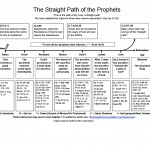 This past week, I came across a chart showing how the Qur’an and the Bible both point toward the coming of Jesus as the Anointed one. I can’t find a LOT about this concept, but the best resource I’ve seen on it so far comes from…
This past week, I came across a chart showing how the Qur’an and the Bible both point toward the coming of Jesus as the Anointed one. I can’t find a LOT about this concept, but the best resource I’ve seen on it so far comes from…
http://thekingdomconversation.com/
along with a summary article at…
http://www.missionfrontiers.org/issue/article/guide-muslims-to-the-bible
My sense is that this approach might be controversial for some (those who fear that prompting any Muslim to spend more time in the Qur’an is a mistake?), but what I’m looking for is — a) What kind of experience do you have with this approach? and b) How have Muslims responded to it, in your case studies? Finally, c) What additional resources have you used or have you heard about that can guide a person in understanding this approach?
If you would be so kind as to click “Comment” following the web version of this item, I’d love for us to explore the use of this approach with a view toward fashioning an understanding of it with our Muslim neighbors today. Thanks in advance for any time you can invest.











I have used this tool with a few of my Muslim friends. It’s a great way to get talking about the gospel using their themes and narratives, which removes a lot of the foreignness of the gospel.
Contextualization is not just about replacing our words with their words, but starting from their existing assumptions – for example, “God sent prophets with signs to show us the straight path.” You might never hear a Christian speak the gospel in this way but it is a way to speak of the gospel using their themes.
Most of the resources that exist and the training opportunities that teach this approach are difficult to find and you have to be in certain circles to get access. However, the website that you’ve referenced is probably the best places to learn more if you’re not in those circles.
I have completed a 9-month TOAG internship, trained at multiple JIQ’s (aka JAQ), and also the Straight Path technique. You might think that this would make me a fan.
Instead, I can attest that, in our experience in the Middle East, nothing beats prayer, the Holy Spirit and direct Biblical references. We never use the Quran. We never debate about it, even though many Muslims try to draw us in.
The Quran is not God’s Word, and isn’t living and active (Hebrews 4:12). However, it is very important to understand the Quran (and the Sunna and Hadiths) so that you can know from where the Muslim is coming in his/her thought processes.
The Gospel is simple, as Paul elegantly describes in 1 Corinthians 15, and can be used quickly in discussions with Muslims after an entry point which the Holy Spirit will open. It’s easy to back up when necessary, and cover Biblical concepts that have been disparaged by their imams and writings.
God has already given us the Truth. Let’s allow His Holy Spirit to work ahead of us, and then give us His wisdom to use His Word wisely as we boldly proclaim the Good News. We plant the seed. He produces the harvest.
Love this response– just let the gospel speak in its simplicity and power.
Perhaps you learned this in a different way than I did, but the straight path I share with Muslims focuses on the stories and not on the Qur’an. It can be shared in as little as five minutes and gives greater context to why Jesus died and rose again. It’s still quite simple and, as with everything else, we NEVER rely on a method but only on the Holy Spirit speaking through us. We’ve seen some Muslims come to faith quickly, but then usually find out the Lord had been working on them long before we ever met them. Everyone of the Muslims I’ve seen come to faith did so through having a relationship with a believer and that takes time to develop. We’ve also seen Muslims come to faith in other ways, but the timeline is a wonderful way to explain our faith in a way that Muslims can understand.
I work in the North Africa region where the Crusades, Colonialism, two World Wars between “Christian” nations, capitalist greed, immorality and violence have been associated with the word “Christian” for generations in their homes, schools, mosques and media outlets. Becoming an atheist is accepted by many here, but becoming a Christian is rarely accepted by families and friends here. Using the Biblical approaches of kingdom circles, the storying approach of “The Message of the Prophets”, and other biblical approaches that I have learned through trainings offered by Common Ground provided me with a solid biblical foundation upon which to begin to test this with Muslims here. Additional helps were the JIQ (Jesus in the Quran) seminar as well as working through the articles of Mission Frontiers, EMQ, and other mission publications over the past 10 years. These have helped me to more deeply appreciate the precious Gospel brought to us through our Lord Jesus Christ, and to avoid adding unbiblical additions in the form of Christian traditions and biases to my sharing the Gospel with Muslims.
I have used the Straight Path illustration often and I find that it is the very best way of sharing the gospel with Muslims. I use the kingdom circles first to see that the person I am talking with is ready to listen (has ears to hear). Taking the prophets in chronological order is a great way of helping them see their need for Christ, as each one builds on the previous one and gives more light. The Muslim feels that this illustration makes sense. I have developed many more details that can be shared, and indeed, plan to write a book about it. This is an approach that uses the principle of starting where a person is, not where he is not (see Acts 8:35). By the way, the stories in the Qur’an about Adam, Noah, Abraham, and Jonah are fairly similar to the Bible, but Moses (Passover) and John the Baptist (Behold the Lamb of God) draw almost exclusively from the Bible. If a person is “allergic” to using the Qur’an, this illustration can be done completely from the Bible. Of all the ways I have shared the gospel with Muslims over the last 40 years, this one is the best.